There’s a quote by Buckminster Fuller that I see a lot, I may have even used it myself in the past:
You never change things by fighting the existing reality. To change something, build a new model that makes the existing model obsolete.

I wish this were the case. Based on some articles that I’ve read recently I think a lot of people believe this is the case. The thoughts that go around in my head are something like this:
Many of the - let’s face it, seemingly rare - people who understand that ‘sustainability’ isn’t about sustaining business-as-usual but sustaining life on Earth, seem to think that we just need to just create a new way of being and doing and things will be solved. However that ignores the fact that sustainable ways of living have existed in the past and continue to exist in many parts of the world today. They either no longer exist, or won’t exist, once they become a threat to the ruling class/dominant Western culture/capitalism (choose which one you prefer, they all amount to the same thing). Anything that threatens the status quo has, or will, be met with extreme measures to suppress the movement including military coups and interventions, outrageously long jail sentences and even genocide.
Unfortunately it is not as simple as just building the new, we must also dismantle the root causes of our ecological and social crises: class domination domestically and colonialism and imperialism internationally.
It is with this in mind that I have been selecting what to read and watch over the last few years, so this is a theme that will likely run throughout most of my fortnightly or monthly newsletters. I’m often flipping between a resource on how to create the new, and another on how to dismantle the old.
Here are some of the most valuable resources I’ve read and watched in the last few weeks, as well as the things that I’ve been doing or learning in this space and the people I appreciate learning from on these topics:
Reading:
The most important thing I have read lately is this solidarity request from the General Federation of Trade Unions in Gaza calling on workers in the US to go beyond words of solidarity and start acting in solidarity with Gaza. UN Special Rapporteur, Professor Ben Saul, has said that “Germany and the United States supply 99% of the weapons exported to Israel” and “[t]hey could stop this conflict overnight if they stopped the weapons that kill the Palestinians.” US workers should follow the example of Moroccan dockworkers who are currently refraining from any involvement in handling military cargo linked to Israel.
Over the last few weeks I’ve been reading Mark Boyle’s books The Way Home: Tales from a Life Without Technology, and The Moneyless Man: A Year of Freeconomic Living. Both of these books were a really interesting and enjoyable read, and definitely ticked the box of ‘other worlds are possible’. Although I don’t subscribe to money being the heart of our problems (markets and trade have existed for many thousands of years), nor do I think that the only sustainable future is one of pure self-sufficiency, I did learn a lot from these books and highly recommend them. I’m currently reading another of Mark’s books, Drinking Molotov Cocktails with Gandhi, which is more about ‘fighting the existing reality’ (per the Buckminster Fuller quote at the top of the page) and I’m finding it my favourite of Mark’s books yet. I definitely recommend it, even if you don’t agree with all of it.
Vincent Bevin’s ‘This Land is Our Land’ feature in The Nation is an exploration of Brazil’s Movimento dos Trabalhadores Rurais Sem Terra (MST), known in English as the Landless Workers’ Movement. MST is a wonderful example of an increasingly effective movement despite right-wing governments sometimes being in power. It seeks to both redress the impacts of colonisation and imperialism and also take care of people’s immediate and longer term needs.
I’m very interested in the way in which the media manipulates citizens in order to achieve outcomes that favour the ruling class. This post by ‘Craigus McVegus’ on Facebook shines a light on just how effective propaganda has been that the Australian political party that scores highest on every independent community scorecard, The Australian Greens, gets the worst press, far fewer votes and subsequently seats, than the Labor or Liberal parties:
This is brainwash in action. And as Chomsky said, “The public doesn’t know what’s happening—and it doesn’t even know that it doesn’t know.”
Source: Craigus McVegus on Facebook
Watching:
The Palestine Laboratory documentary by Al Jazeera and Antony Loewenstein (Episode 1 below, Episode 2 here, based on Loewenstein’s book of the same name) is a must watch on how Israel is not only exporting military and surveillance equipment to the rest of the world, but also an idea:
… a way to seperate and control unwanted populations … and despite what they are doing right here in Gaza, [some countries] see that as a reason to copy Israel even more.
Source: Antony Loewentein, The Palestine Laboratory Episode Two, 47 minutes, 30 seconds
Watching it reminded me of this piece: ‘Against Fortress Degrowth: The Need for a Border Perspective in the Degrowth Discourse’, which explores the internationalist nature that degrowth should be (and isn’t yet). Definitely take some time to explore of the links in the article, they are well worth it.
This 1986 footage of Joe Biden talking about the US needing Israel to “protect her interests” is not new to me, but I think it’s relevant in light of the genocide happening in Gaza and the link it has to imperialism:
If we look at the Middle East I think it’s about time we stop - those of us that support, as most of us do, Israel in this body - for apologising for our support of Israel. There is no apology to be made. None. It is the best $3 billion investment we make. Were there not an Israel the United States of America would have to invent an Israel to protect her interests in the region. The United States would have to go out and invent an Israel.
- Former US President, Joe Biden, in 1986. Source: Going Underground on X.
This ‘Land Liberators’ episode by
is an eye-opening short documentary on Columbian farmers who are risking their lives to take back their land from multi-national corporations.Doing:
This week we’ve cooked these vegan scones (that go nicely with this vegan cream and jam, not whole foods, but it was my birthday treat!), mushroom san chow bow and I also made this delicious vegan feta.
We visited a farmed animal sanctuary, Moo to Ewe on the NSW Central Coast, and fed and cuddled some cows, pigs, sheep, goats, ducks, chickens and alpacas. It was such a fun morning!
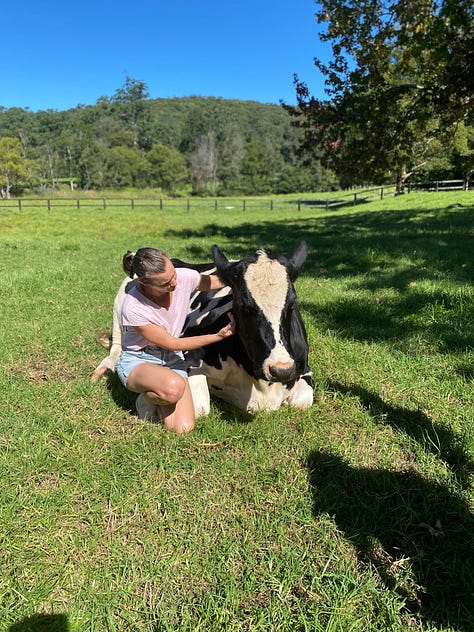
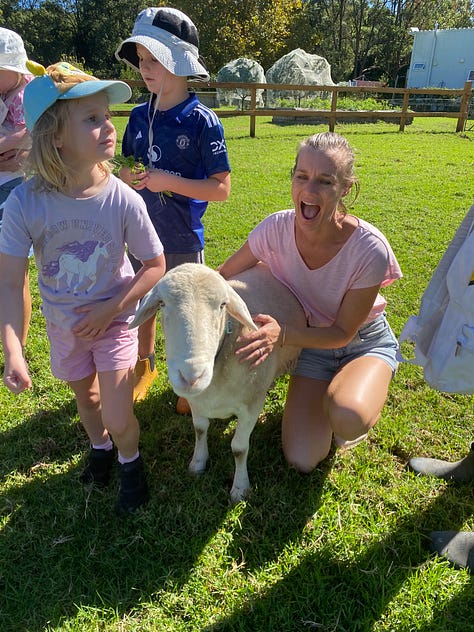

In case it’s not clear how what I’m cooking and the animals we’re visiting are linked to the topic of ‘dismantling the old and building the new’ here are a couple of resources on the colonial nature of the standard western diet and how eating a plant-based diet is an act of resistance: 1, 2, 3. Here are a couple of resources on the violence inherent in animal agriculture: 1, 2. And there’s always that fact that industrial animal agriculture is the main source of breaching planetary boundaries.
We’ve also been on a few walks lately and seen some stunning sights:

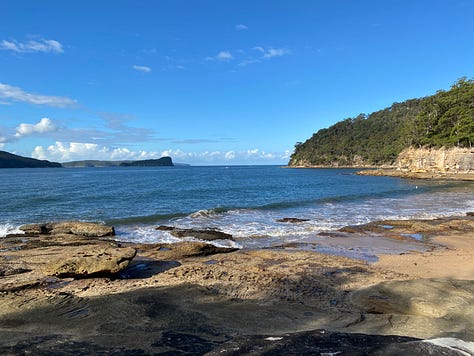
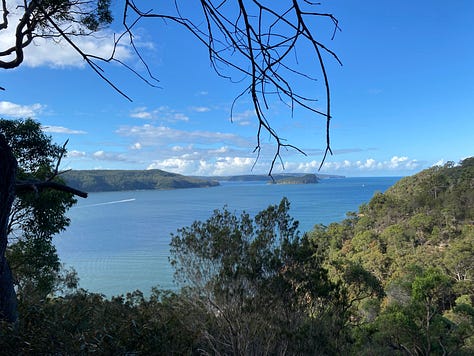
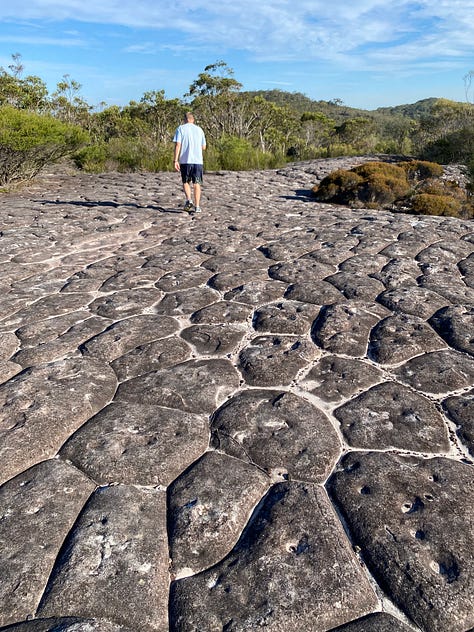


Following:
Caitlin Johnstone’s work, in particular on the genocide happening in plain sight in Gaza, is very important and I encourage everyone to follow her. This is her website, and she is also on Substack, X, Instagram, and Tik Tok.
I have recently subscribed to the Sufficiency & Wellbeing Magazine, an “an online, reader-supported publication of short articles that advocate for sufficiency and wellbeing, from a degrowth-friendly, anti-capitalist angle” (Disclaimer: my work has been published in it).
I LOVE following and have leant a lot from Aashis Joshi, a PhD student from Nepal who describes himself as thinking “about power imbalances, ecological overshoot, and collapse, and the systems and ideologies driving them, including our capitalist techno-industrial modernity”. You can find him on X, LinkedIn and Bluesky.
I’m trying something a little different. ‘Come and Learn with Me’ is a fortnightly, or perhaps monthly, newsletter sharing the things I’ve been reading, watching, listening to, doing and the people I follow and learn from with a focus on colonialism, imperialism, class domination, degrowth, climate, veganism, activism, community and organising.
Erin Remblance is a Sydney-based researcher and writer, focusing on the topics of degrowth, climate, veganism and social change. She is a co-creator of PROJECT TIPPING POINT.



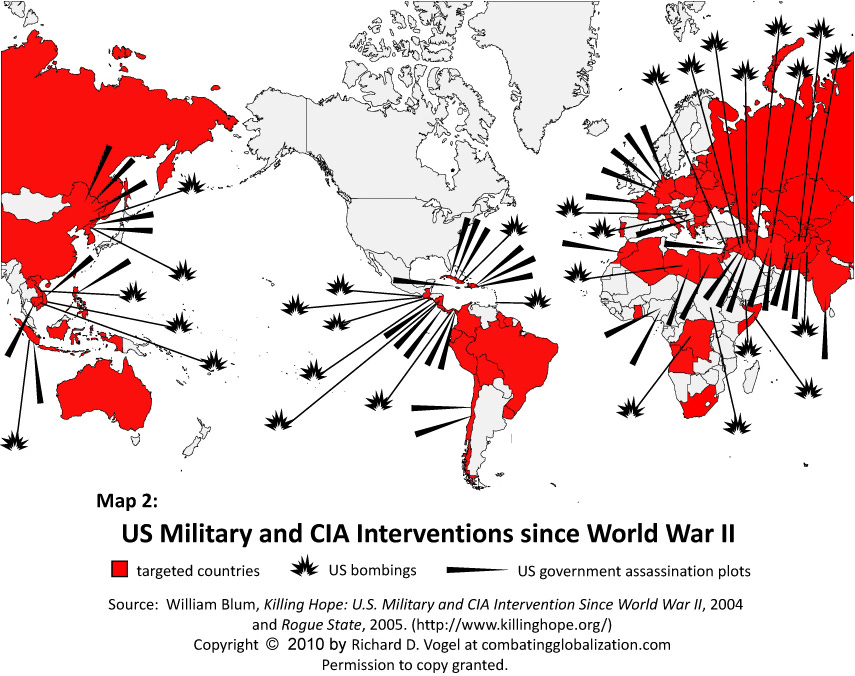
Thanx Erin, it's always good to link to people and information resisting the clusterfcuk we find ourselves in.
In that vain I suggest taking a look at Peter Gelderloos work.